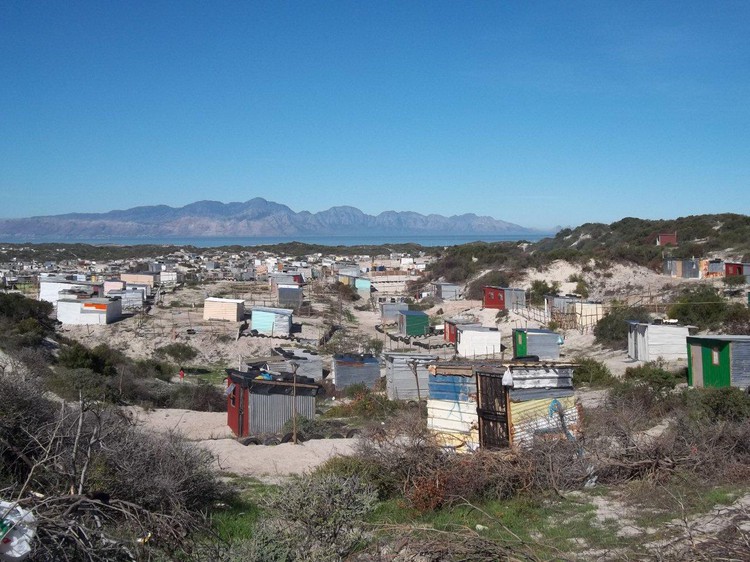
13 November 2025
The voices of women in informal settlements are often silenced, say the authors. Archive photo: Vincent Lali
On a Thursday afternoon, around 3pm, residents of an informal settlement gathered to discuss the upgrading of their settlement. A young woman called Minenhle Zuma (not her real name) started speaking, but before she could finish, someone in the crowd shouted ‘Angeke siphathwe ngabafazi thina’: ‘we can’t be controlled by women’.
Minenhle and the other women in the meeting were silenced.
This happens often, as research by the Socio-Economic Rights Institute (SERI) shows. Women in informal settlements are systematically excluded from participating in local political life by patriarchal norms and entrenched gender discrimination.
Gendered stereotypes within households spill over into public spaces, forcing women to reckon with the combination of their roles as daughters, wives, mothers and women, even outside their homes.
Beliefs about where women should spend their mental and physical energy, such as maintaining the household, looking after children and preparing meals, limit their ability to be involved in the community. Their leadership capabilities are often disregarded or mistrusted, and their political or community involvement is seen as inappropriate or prompted by ulterior motives like infidelity or romantic pursuits.
In this social context, where those with the strongest voices have the most authority, women battle to be taken seriously.
Yet women face particular challenges with regard to access to basic services and have a lot to say.
Inadequate sanitation exposes women to health risks, reduced privacy, and increased vulnerability to assault, particularly during menstruation or pregnancy, when women use shared toilets more frequently. Women often bear the burden of cleaning shared facilities without municipal support. And women are often forced to pay for access to toilets, which are frequently controlled by informal ‘toilet mafias.’
Electricity shortages leave women especially vulnerable in dark environments; dangers are compounded by poor roads, which force women to travel along the peripheries of informal settlements on foot to find transport.
Within the household, responsibilities such as caregiving, domestic duties, and water collection are perceived as non-negotiable and exclusively assigned to women. This limits women’s ability to look for and find formal employment.
Women’s access to resources, safety, and tenure security is influenced by their relationships, with married women considered most secure, followed by unmarried women living with a man. Single women and widows are the most vulnerable.
StatsSA reports that more than 40% of households are headed by women. In informal settlements, that figure is 53%. This means that prioritising the needs of women will have a direct impact on improving the lives of a significant portion of some of the country’s most vulnerable households.
Better sanitation — waterborne systems if possible, or at least household chemical toilets — can provide safer and more private options for women.
Well-placed high-mast lighting can improve visibility, reducing the risk of violence, especially in dense settlements.
Targeting women for employment in informal settlements, especially in the process of upgrading, can help address unemployment. Meanwhile, better locations for street vendors - most of whom are women - on high traffic, visible areas, such as main roads and transport hubs, can increase customer reach and improve the safety of the vendors.
When we spoke to women living in informal settlements, they described their experiences in two contrasting ways. On one hand, they felt isolated and neglected. But on the other hand, women recognised the strength it takes to survive and be an active member of the community within an informal settlement.
Many expressed their frustration at being dismissed by both their communities and by institutions that take their requests for help and reports of abuse as fabricated or strategic.
The White Paper on Human Settlements, the overarching policy framework for housing in the country, approved by Cabinet at the end of 2024, includes a proposal on the establishment of a National Stakeholder Forum. This is an opportunity for the state to listen to women speaking about their needs and those of their children.
Women’s organisations in informal settlements, like the Women’s League of Abahlali baseMjondolo (led by one of the authors), can offer communication channels with the state and with other women facing similar struggles.
The starting point must be meaningful engagement with women in informal settlements so that women like Minenhle can contribute to matters that affect them directly and speak their minds without being silenced.
Lungelo Mncwabe is a Women’s Spaces Research Intern at the Socio-Economic Rights Institute of South Africa (SERI).
Zandile Nsibande is the National Coordinator for Abahlali baseMjondolo Women’s League.
Nerishka Singh is the former Women’s Spaces Project Coordinator at SERI.
Views expressed are not necessarily those of GroundUp.